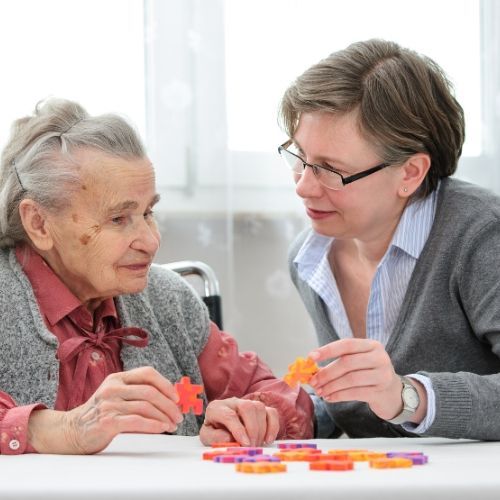Learning to become a full time carer for a family member is a significant decision that requires deep understanding and preparation. It is not merely a role but a calling that involves emotional, physical, and sometimes financial commitment. The journey of becoming a full time carer for a family member can be challenging yet incredibly rewarding.
In this blog, we will discuss the key aspects of becoming a full-time carer, the various types of care, responsibilities involved, and how to develop an effective care plan.
Who is a Full Time Carer?
Becoming a full-time carer for a family member is not simply about looking after someone. It involves a dedicated and continuous effort to meet the physical, emotional, and medical needs of a loved one. A full-time carer is someone who takes on the responsibility of caring for another person around the clock.
Key Responsibilities of a Full-Time Carer
As a full-time carer, your responsibilities are vast. They typically include the following:
- Personal Care. Helping with daily activities such as bathing, dressing, grooming, and toileting.
- Medication Management. Ensuring medications are taken on time and in the correct dosage.
- Assistance with Mobility. Helping the person move around the house, whether it's through walking, using a wheelchair, or assisting with transfers from bed to chair.
- Providing Emotional Support. Offering comfort and reassurance during difficult times, especially for individuals suffering from conditions like dementia or terminal illness.
- Monitoring Health. Keeping track of any health changes, such as weight loss, signs of infections, or any new symptoms.
Being a full-time carer can be physically and emotionally draining. It's important to recognize the gravity of these responsibilities and seek assistance when needed.
The Emotional and Physical Demands of Full-Time Caregiving
Caring for someone full-time can be emotionally and physically demanding. It is common to feel overwhelmed, exhausted, and even frustrated as you manage the complexities of their care. Many caregivers also experience feelings of sadness or guilt, especially as they witness the decline of their loved one's condition.
In addition to the emotional strain, caregiving places significant physical demands on the body. Daily tasks such as lifting, bending, or standing for long periods can lead to muscle aches, fatigue, and other physical discomforts. Over time, these physical strains may take a toll on your health if not properly managed.
It’s essential to prioritise self-care, balance your work and health, and seek support when needed. By taking care of your own well-being, you can continue to provide the best care for someone without compromising your own health.
Different Types of Full-Time Carer
When you think about caregiving, it's important to understand that full-time carers can take on many different forms. Here are some of the most common types:
How to Become a Full-Time Carer for a Family Member?
Becoming a full-time carer for a family member is a big decision that requires careful planning.
Here's how you can navigate the process:
Assessing the Care Needs of Dependent
Before deciding to become a full-time carer, it’s important to evaluate the specific needs of an individual or patient. Do they require help with daily activities such as bathing, dressing, or eating? Are there medical needs that require regular supervision, such as medication management or physical therapy? Understanding the level of care required will guide your next steps in the caregiving process.
Recognizing the Responsibilities of Full-Time Caregiving
Becoming a full-time carer comes with significant emotional and physical demands. It's crucial to understand that this role will take up a substantial amount of your time and energy. The responsibilities will likely include providing physical assistance, emotional support, and managing healthcare tasks. Knowing the scope of these duties will help you prepare for the commitment ahead.
Seeking External Support and Resources
Caregiving is a challenging responsibility, and you don't have to do it alone. Reach out to healthcare professionals, caregivers' groups, or home care agencies for advice and support. Social workers can also offer additional resources or guide you to financial assistance programs. Support networks are invaluable for caregivers, both emotionally and practically.
Exploring Financial Assistance for Caregiving
Caregiving can have financial implications, especially if you have to reduce your work hours or stop working altogether. Researching available financial support, such as caregiver allowances, insurance benefits, or government aid programs, can help ease the financial burden. Being aware of these options ensures that you can focus on providing care without financial stress.
Gaining Knowledge Through Caregiver Training
Depending on the family member or care recipient’s needs, you may benefit from caregiver training. This could involve learning how to manage medical conditions, administer medications, or handle special situations like dementia. Workshops, online courses, or certifications can provide you with the knowledge and skills to care for your loved one effectively and confidently.
What Signs Indicate Someone Needs Full-Time Care?
Before becoming a full-time carer for a family member, it’s essential to identify whether they truly need full-time assistance. Some signs that indicate someone needs full-time care include:
- Inability to perform daily tasks: Struggling with personal hygiene, meal preparation, or basic household chores.
- Frequent falls or accidents: A history of falls or difficulty with mobility could signal the need for full-time care.
- Cognitive decline: Forgetting medications, getting lost, or having difficulty with memory or problem-solving.
- Chronic health issues: Managing chronic conditions such as heart disease, diabetes, or cancer may require around-the-clock care.
- Behavioural changes: Increased confusion, aggression, or depression may indicate that more specialised care is needed.
How to Develop an Effective Care Plan
An effective care plan is essential to ensure that the person you are caring for receives the right support. It provides a roadmap for both the carer and the person receiving care. Here's how to create one:
- Assess Needs. Begin by thoroughly assessing the person’s needs. This includes medical requirements, personal care, mobility assistance, and emotional support.
- Set Clear Goals. Define specific goals such as improving mobility, maintaining independence, or enhancing quality of life.
- Create a Daily Schedule. Develop a daily routine that includes care tasks, meals, medication administration, and social activities.
- Coordinate with Healthcare Providers. Collaborate with doctors, nurses, and therapists to ensure the care plan addresses all medical and health needs.
- Review Regularly. As the person’s condition changes, regularly review and adjust the care plan to meet evolving needs.
Frequently Asked Questions
Can I be paid to care for a family member?
Yes, it is possible to receive payment for caring for a family member, depending on your country’s policies and the specific circumstances. Some government programs and financial assistance options are available for caregivers.
How do I register as a carer for a family member?
The process of registering as a carer varies by location. Typically, you may need to apply through local health services, government agencies, or caregiver programs. Check with your country or state's social services or health departments for specific registration procedures.
What financial support is available for family carers?
Many countries offer financial assistance for family carers, such as carer’s allowance or direct payments. You may also be eligible for tax breaks or additional support if you're a primary caregiver. Check with local government programs for more details on the available financial support.
Do I need any special training to become a carer for a family member?
While not always required, caregiver training can be beneficial. It can provide knowledge on managing specific health conditions, administering medication, handling medical equipment, and dealing with emotional or behavioural challenges. Training programs and workshops are often available online or through healthcare organisations.
What are my legal rights as a carer?
As a caregiver, you may have specific rights, including time off work (in certain countries), financial support, and protection against discrimination. You may also have the right to seek help or access services to assist you in your caregiving role. Always check local regulations and resources for details on your rights as a carer.
Final Thought
Becoming a full-time carer for a family member is a huge responsibility that requires careful planning, emotional resilience, and practical support. While this role can be immensely rewarding, it also demands significant physical and emotional effort. It is crucial to assess the situation, seek help, and develop a comprehensive care plan that supports both the caregiver and the family member in need. By recognizing the key roles and responsibilities involved, understanding the emotional and physical toll, and knowing when and how to provide care, you can navigate the path of becoming a full-time carer for a family member with confidence and compassion.
Whether you are considering becoming a full-time carer for a family member or are already providing home care, understanding the demands and being prepared can make all the difference in ensuring the well-being of your loved one while also taking care of yourself.












